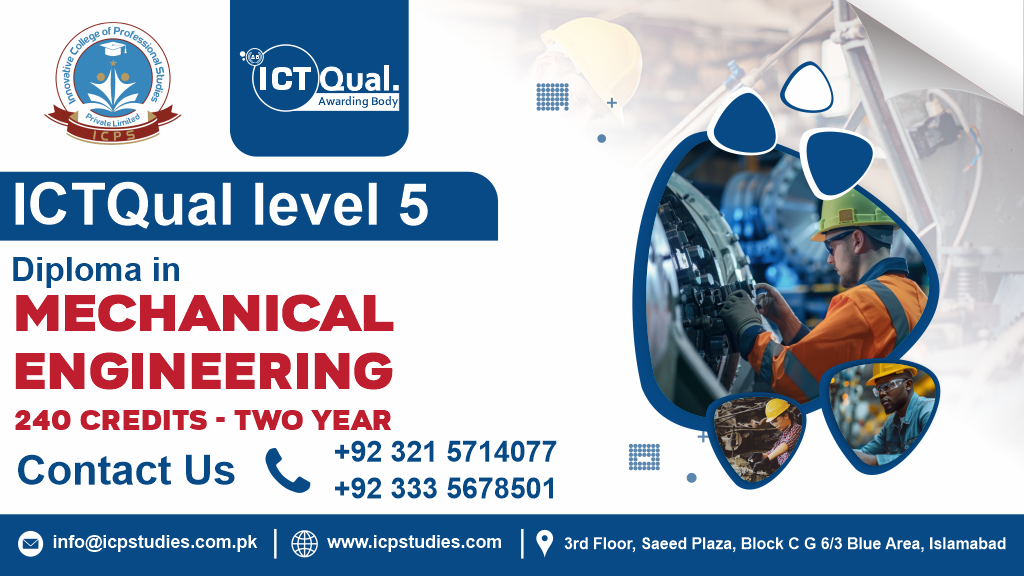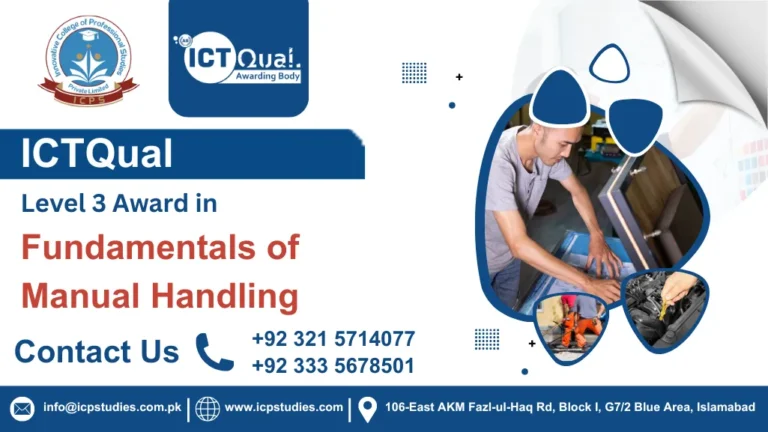The ICTQual Level 5 Diploma in Mechanical Engineering (240 Credits) is a comprehensive, two-year qualification designed for individuals who wish to deepen their expertise in mechanical engineering. This advanced-level course equips students with both theoretical knowledge and practical skills necessary to excel in the mechanical engineering field. It is ideal for those aiming to pursue higher-level engineering roles, gain industry-recognized certification, or prepare for further academic study in engineering.
The ICTQual Level 5 Diploma in Mechanical Engineering is a robust, 240-credit qualification that spans two years. It focuses on advanced mechanical engineering topics such as thermodynamics, mechanical systems, fluid mechanics, and materials science. Through a combination of theoretical instruction, practical assignments, and hands-on projects, students will gain the ability to design, analyze, and optimize mechanical systems across various sectors.
The ICTQual Level 5 Diploma in Mechanical Engineering (240 Credits) is the ideal qualification for those looking to gain advanced knowledge and skills in mechanical engineering. With a combination of theoretical learning, practical application, and industry-relevant topics, this course provides a comprehensive pathway for career development, further study, and leadership in the field. Whether you’re an aspiring engineer, an experienced professional, or someone looking to transition into the industry, this diploma will equip you with the tools and expertise to succeed.
All About ICTQual Level 5 Diploma in Mechanical Engineering 240 Credits-Two Years
Course Overview
The ICTQual Level 5 Diploma in Mechanical Engineering (240 Credits) is an advanced, two-year qualification designed to equip students with the knowledge, skills, and practical expertise required for a successful career in mechanical engineering. This comprehensive course is perfect for individuals looking to gain in-depth understanding and hands-on experience in key areas such as thermodynamics, mechanical systems, fluid mechanics, materials science, and mechanical design.
This diploma provides a strong foundation for anyone aiming to take on higher-level roles in the engineering field, whether in design, manufacturing, or project management. Throughout the program, students will engage in challenging coursework, develop proficiency in advanced engineering tools, and solve real-world problems to prepare them for complex engineering challenges in industries such as automotive, aerospace, energy, and manufacturing.
The ICTQual Level 5 Diploma in Mechanical Engineering is internationally recognized, ensuring that graduates are equipped with the expertise to advance their careers globally. Whether you are looking to pursue further academic qualifications or jump into professional practice, this qualification opens doors to a wide range of engineering roles.
Study Units
- Year 1 (120 Credits)
- Introduction to Mechanical Engineering
- Engineering Mathematics
- Physics for Engineers
- Engineering Materials
- Technical Drawing and CAD
- Thermodynamics
- Mechanics of Solids
- Fluid Mechanics
- Health and Safety in Engineering
- Introduction to Manufacturing Processes
- Electrical and Electronics Fundamentals for Engineers
- Communication and Professional Skills
- Year 2 (120 Credits)
- Advanced Thermodynamics
- Mechanics of Machines
- Engineering Design and Analysis
- Computer-Aided Engineering (CAE)
- Automation and Control Systems
- Renewable Energy Systems
- Heat Transfer Applications
- Dynamics of Machinery
- Advanced Manufacturing Processes
- Robotics and Mechatronics
- Engineering Project Management
- Capstone Project in Mechanical Engineering
To be eligible for the ICTQual Level 5 Diploma in Mechanical Engineering (240 Credits), candidates must meet the following entry requirements:
1. Educational Qualifications
- A Level 4 qualification in a relevant field, such as a Level 4 Diploma in Engineering, a foundation degree, or an equivalent qualification in mechanical engineering, physics, or a related technical discipline.
- Alternatively, candidates with A-levels or a Level 3 Diploma in Engineering (or equivalent) and relevant work experience may also be considered.
2. Mathematics and Science Background
- A solid understanding of mathematics (ideally up to A-Level or equivalent) is essential, as many of the course units involve advanced mathematical concepts like calculus, algebra, and differential equations.
- A strong foundation in science (especially physics) is recommended to succeed in topics like thermodynamics, fluid mechanics, and materials science.
3. English Language Proficiency (For International Students)
- IELTS score of 5.5 or equivalent, or an equivalent qualification demonstrating proficiency in English, if the applicant’s first language is not English.
4. Work Experience (Optional)
- While work experience is not mandatory, it is advantageous. Previous work experience in mechanical engineering or a related field may support your application, especially for candidates without a formal Level 4 qualification.
5. Personal Statement or Interview (If applicable)
- A personal statement outlining your motivation for pursuing the course, career aspirations, and relevant skills may be required.
- Some institutions may request an interview to assess the applicant’s commitment, suitability for the course, and understanding of the subject matter.
Candidates who meet these criteria will be considered for admission to the course. If you are unsure about your eligibility or need further clarification on the entry requirements, it’s best to contact the course provider for personalized advice.
The ICTQual Level 5 Diploma in Mechanical Engineering (240 Credits) is designed for a diverse range of individuals who are eager to advance their careers in mechanical engineering. Whether you are starting your engineering journey, aiming to specialize, or looking to elevate your existing expertise, this course provides the necessary skills and knowledge. Here’s who would benefit most from this course:
1. Aspiring Mechanical Engineers
- Individuals who are passionate about mechanical systems and want to build a strong foundation in engineering principles. This course offers an in-depth understanding of key areas such as thermodynamics, fluid mechanics, and mechanical design, providing a solid base for entering the industry.
2. Engineering Professionals Seeking Career Advancement
- Engineers with prior qualifications, such as a Level 4 diploma or equivalent, who wish to take on more advanced roles in mechanical design, manufacturing, or project management. The course provides the necessary skills to progress into leadership or senior technical positions.
3. Technicians and Technologists
- Mechanical engineering technicians or technologists who already work in the industry and want to deepen their expertise. The course is ideal for those looking to move from a hands-on role into positions with more responsibility, such as system designer, project manager, or technical specialist.
4. Graduates with a Related Background
- Individuals with a background in related fields such as electrical engineering, aerospace engineering, or civil engineering who wish to expand their knowledge and move into mechanical engineering. This diploma is suitable for those who want to transition into the mechanical engineering sector or broaden their career opportunities.
5. Career Changers
- Professionals from other industries, such as construction, automotive, or manufacturing, who wish to pivot to mechanical engineering roles. If you have the technical aptitude and an interest in mechanical systems, this course will help you acquire the qualifications needed to switch career paths.
6. Entrepreneurs and Innovators
- Individuals who aspire to start their own engineering-related business or engage in product development. The course covers essential skills in design, innovation, project management, and sustainability, making it ideal for those interested in developing new mechanical technologies or creating engineering solutions.
7. Engineers Looking for International Career Opportunities
- The ICTQual Level 5 Diploma is internationally recognized, which makes it an excellent choice for those aiming to work in the global engineering industry. This course will prepare you for engineering roles in multinational companies or in countries where there is high demand for qualified engineers.
8. Technologically Inclined Learners
- Those with a strong interest in the application of new technologies, such as robotics, automation, and computational fluid dynamics (CFD), will find this course particularly rewarding. It provides in-depth learning of cutting-edge technologies used in modern mechanical engineering.
9. Individuals Preparing for Further Study
- For students looking to pursue higher academic qualifications, such as a Bachelor’s degree or Master’s degree in mechanical engineering or a related field, this diploma serves as a solid stepping stone.
Whether you’re just starting in mechanical engineering or looking to further your career, the ICTQual Level 5 Diploma in Mechanical Engineering is the ideal course to develop specialized knowledge and skills in the field.
Learning Outcomes
The ICTQual Level 5 Diploma in Mechanical Engineering is structured into two years of intensive study, each comprising of distinct yet complementary units. Below is a breakdown of the learning outcomes for each of the study units:
Learning Outcomes for Year 1 (120 Credits)
- Engineering Mathematics
- Master advanced mathematical techniques including calculus, linear algebra, and differential equations to solve engineering problems.
- Apply mathematical modeling to analyze mechanical systems, aiding in the design and optimization of mechanical structures and processes.
- Mechanics of Materials
- Understand how materials behave under various loading conditions, including stress, strain, and deformation.
- Apply concepts of elasticity, plasticity, and material failure to real-world engineering challenges.
- Thermodynamics
- Comprehend the laws of thermodynamics and apply them to mechanical systems, focusing on energy conservation, enthalpy, and entropy.
- Solve problems related to thermodynamic cycles in engines, refrigeration systems, and power generation.
- Fluid Mechanics
- Apply principles of fluid statics and dynamics to analyze fluid flow in mechanical systems like pipes, ducts, and open channels.
- Use Bernoulli’s equation and other fluid dynamics tools to solve flow-related engineering problems.
- Materials Science
- Understand the structure-property relationships in materials like metals, polymers, and composites.
- Evaluate materials based on mechanical properties, environmental conditions, and manufacturing processes for specific applications.
- Mechanical Drawing and CAD (Computer-Aided Design)
- Produce technical drawings and 3D models using CAD software, ensuring design accuracy and clarity.
- Apply engineering drawing standards, such as dimensioning and tolerancing, to effectively communicate design intent.
- Manufacturing Processes
- Gain insight into various manufacturing techniques such as casting, welding, and additive manufacturing.
- Assess and select the most suitable manufacturing methods based on cost, quality, and product specifications.
- Engineering Mechanics
- Analyze static and dynamic systems using Newton’s laws of motion, focusing on force analysis, equilibrium, and structural integrity.
- Apply mechanics principles to evaluate forces, moments, and stress in mechanical components.
- Control Systems
- Understand the fundamental principles of control theory, such as feedback loops, stability, and performance.
- Design and analyze control systems for mechanical applications using tools like block diagrams and transfer functions.
- Health, Safety, and Environment in Engineering
- Identify potential health and safety risks in mechanical engineering processes.
- Implement safety protocols and environmentally sustainable practices to minimize hazards in engineering projects.
Learning Outcomes for Year 2 (120 Credits)
- Advanced Engineering Mathematics
- Apply sophisticated mathematical methods, including partial differential equations and numerical analysis, to solve complex mechanical engineering challenges.
- Model and simulate engineering systems with a high degree of accuracy and precision.
- Dynamics and Vibration Analysis
- Analyze dynamic systems, including vibrations, resonance, and damping effects on mechanical components.
- Apply vibration analysis to design systems that minimize unwanted vibrations or optimize dynamic behavior.
- Engineering Materials and Processes
- Evaluate advanced materials such as composites and high-performance alloys, along with their manufacturing processes.
- Select materials based on mechanical properties, cost considerations, and environmental factors for specific applications.
- Finite Element Analysis (FEA)
- Utilize FEA software to simulate stress, strain, and deformation in mechanical systems and components.
- Interpret FEA results to optimize designs, ensuring safety and efficiency of mechanical products.
- Mechanical System Design
- Design complex mechanical systems, integrating engineering principles, material selection, and manufacturing processes.
- Ensure designs meet functional, safety, and cost requirements through systematic engineering approaches.
- Power Transmission Systems
- Analyze and design mechanical systems for power transmission, such as gears, pulleys, and shafts.
- Understand principles like torque, efficiency, and load distribution to optimize mechanical power transmission.
- Refrigeration and Air Conditioning Systems
- Apply thermodynamics to the design and analysis of refrigeration and air conditioning systems.
- Develop energy-efficient and environmentally friendly cooling and heating systems for diverse applications.
- Project Management in Engineering
- Develop key project management skills, including planning, budgeting, and resource management.
- Apply project management tools to ensure the successful delivery of mechanical engineering projects, meeting timelines and quality standards.
- Advanced Fluid Mechanics
- Study advanced fluid dynamics concepts, including compressible flow, turbulence, and non-Newtonian fluids.
- Solve complex fluid flow problems in mechanical systems, such as turbines, pumps, and heat exchangers.
- Sustainable Engineering
- Integrate sustainability principles in mechanical engineering designs by selecting environmentally responsible materials and energy-efficient technologies.
- Assess product lifecycles to minimize environmental impact, optimize energy use, and promote waste reduction.
- Mechanical Testing and Quality Assurance
- Apply mechanical testing methods such as tensile, impact, and fatigue testing to ensure component reliability.
- Implement quality assurance practices to monitor and improve the performance of mechanical systems throughout their lifecycle.
- Mechatronics
- Integrate mechanical, electrical, and computer systems to design automated systems and robotics.
- Apply mechatronics principles to create smart devices used in manufacturing, automation, and industrial applications.
- Engineering Optimization Techniques
- Use optimization methods, such as linear programming and genetic algorithms, to enhance mechanical system performance.
- Apply these techniques to design problems related to material usage, cost reduction, and efficiency improvement.
- Capstone Project / Engineering Research
- Conduct independent research or engage in a practical engineering project, applying learned skills to real-world challenges.
- Present comprehensive engineering solutions, including design, analysis, testing, and evaluation, in a professional report or presentation.
These learning outcomes ensure that graduates of the ICTQual Level 5 Diploma in Mechanical Engineering are well-equipped to tackle complex engineering challenges, lead projects, and contribute to innovations in the mechanical engineering field.
FAQs about ICTQual Level 5 Diploma in Mechanical Engineering 240 Credits-Two Years






